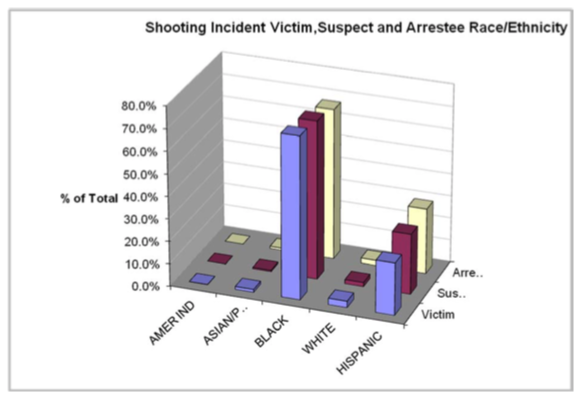
When Stephen Paddock fired on a crowd of concertgoers in Las Vegas on Oct. 1, killing 58 and wounding hundreds, Americans wanted to know the motive behind the worst mass shooting in modern American history. Was Paddock a terrorist? Did he have accomplices? Was he mentally ill?
Nearly four months later, we still don’t know his motives, but we can be reasonably sure that Paddock acted alone and that he wasn’t crazy. An 81-page preliminary report issued last week by the Las Vegas Metropolitan Police Department says as much, breaking down in great detail Paddock’s movement in the days and weeks leading up to his rampage at the Mandalay Bay Resort and Casino. But after nearly 2,000 investigative leads, 21,000 thousand hours of video, hundreds of thousands of images captured, and nearly 750 legal notices filed or sent, the report concludes that “nothing was found to indicate motive on the part of Paddock or that he acted with anyone else.”
Lacking a motive, some commentators have turned to other, more rarefied culprits. Laura Kiesel, writing in Politico, argues we shouldn’t blame mental illness for mass shootings like the one in Las Vegas. Instead, we should blame men: “If we want to stop the problem of mass shootings, we need to fix the problem of toxic masculinity.”
Kiesal goes on to cite crime statistics and sociological studies about everything from anxiety disorders to media messaging to bolster her claim that men and their toxic masculinity are somehow to blame for mass shootings.
“Men don’t just constitute almost all mass shooters in recent history; they are also responsible for the vast majority of gun-associated deaths in the country,” writes Kiesel. “Men own guns at triple the rate of women in the U.S., at 62 percent compared to 22 percent—and also commit suicide at nearly triple the rate of women. Eighty-nine percent of murder-suicides are committed by men, and most often include an unwitting female partner or ex-partner.”
Whether Kiesel realizes it or not, she’s talked herself into a position that can only be described as bigoted. What’s the difference, after all, between her argument and saying that we should not blame gun rights for gun violence, we should blame black men? There is no difference—indeed, there’s even a strong statistical correlation between black men and gun violence to back up such an outrageous claim.
Here’s How The Left Stumbles Into Bigotry
Consider the New York Police Department (NYPD) crime statistics for 2016, which show a staggering disparity in gun-related crime by racial category, with blacks accounting for the vast majority of shooting victims, suspects, and arrestees (72.5, 70.7, and 67.5 percent, respectively)—and this is in a city where blacks account for only about a quarter of the population.
Here are those figures in a shocking bar graph from the NYPD:

What does Kiesel make of such statistics? Based on her own reasoning, should she not conclude that the real problem with gun violence in New York City is black men? After all, if the vast majority of mass shootings in America are committed by men, and from this we conclude that what’s behind mass shootings is a social malady of “toxic masculinity,” then should we not also conclude that what’s behind gun violence in New York City is a social malady of toxic black male-ness?
The mere suggestion is of course offensive, and no reasonable person would conclude this from the NYPD crime statistics. But here we see the fundamental flaw in Kiesel’s reasoning. It’s true that black men in New York are doing a lot of shooting—but not because they’re black men. Race has absolutely nothing to do with it.
Far more likely culprits are government welfare policies and the dysfunctional family culture they create. The poisonous combination of welfare and minimum wage laws has gradually hollowed out entire urban communities, weakened families, and suppressed social mobility. If you restrict economic opportunity for long enough, you end up with communities where single parenthood is rampant and crime is pervasive. This is largely what’s to blame for the rates of gun violence, among other social ills, we see among black residents of New York—not race or sex or any other coincidental correlation. If we want to talk about the shocking rates of gun violence among blacks in New York, this is where we should start.
But because that’s not a conversation the Left is willing to have, we will continue to witness the spectacle of earnest, link-heavy essays in national publications arguing that a person’s sex disposes him to commit gun violence. With apologies to Kiesel, who I’m sure is no racist, this argument is as preposterous as suggesting that a person’s race disposes him to commit gun violence, and it should be treated with the same scorn.
Denying Human Nature Comes With Real Costs
All of that leaves the question of Paddock’s motive. Nothing about his life suggests he would commit this terrible crime. He was not impoverished or desperate. Being married, he was at least not a complete romantic failure. He seems to have had little in common with other recent mass shooters like Dylann Roof, the lonely white supremacist, or Omar Mateen, the confused would-be jihadi.
He had no accomplices, no radical politics, no prior criminal record, and no evidence of mental illness. He left no manifesto or suicide note. The only scrap of paper found in Paddock’s room with any writing on it, according to the police report, was “a small note indicating measurements and distances related to the use of rifles.”
That sparse and harrowing detail, tucked away in the report, underscores the cold inhumanity of the Las Vegas massacre. We understandably want to explain Paddock’s behavior and attribute it something like mental illness. He must have been depressed or bipolar or schizophrenic. He must have been part of some extremist movement. Some external factor must explain his monstrous deed.
But this search for external causes is a modern and progressive impulse. So far we have no explanation or motive except that Paddock was a wicked man intent on doing evil. Those words—wicked, evil—are not taken very seriously by the sort of people who would prefer to blame Paddock’s crimes on toxic masculinity or mental illness. Progressives in particular scoff at the very idea of human nature, much less that it is fallen and corrupt and capable of doing great evil.
To suggest that something so arcane and old-fashioned as the wickedness of human nature is to blame for Las Vegas is, for progressives, tantamount to blaming a demonic spirit. It is absurd and unscientific. After all, human nature is itself a delusion, a phantom of the imagination no more real than a demon or a wood sprite. Such talk is beneath serious people in the twenty-first century.
Much like the Left is unwilling to have a conversation about the real causes of gun violence in New York City, so too is it unwilling to have a conversation about human nature and the reality of evil. Progressives can no more admit that government welfare policies are the root cause of gun violence in New York than they can admit that fallen human nature is the root cause of mass shootings like Las Vegas.
That’s too bad, and not just because it causes otherwise-decent people like Kiesel to talk themselves into making bigoted arguments better suited to an alt-right blog. There are real costs to denying human nature and real implications to the notion that something like “toxic masculinity” can be rooted out or suppressed.
Make no mistake, when progressives talk about “addressing toxic masculinity” they are making a claim about human nature: men and women and children can be molded into whatever we choose. Indeed, men can be made into women, and boys into girls. There is nothing, really, to stop us. Certainly nothing so preposterous as human nature. If we can only shed these superstitious notions, they say, our eyes will be opened, and we shall be as gods.








